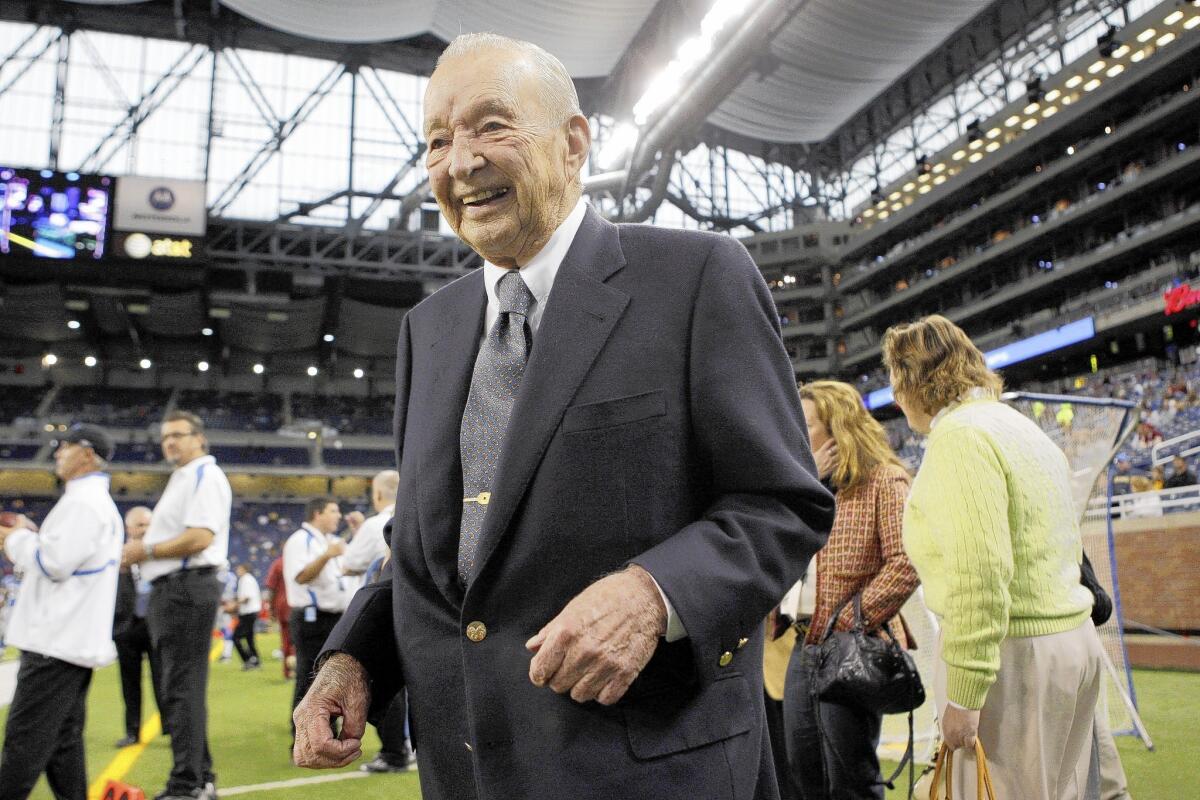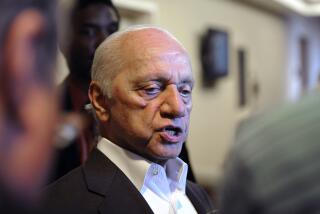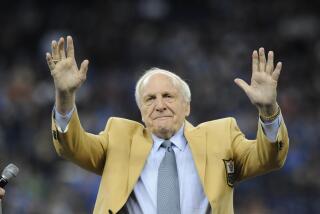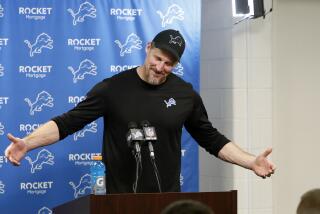William Clay Ford dies at 88; auto company scion owned Detroit Lions

William Clay Ford, a billionaire who owned the Detroit Lions and was an heir to the automotive dynasty started by his grandfather Henry Ford, died Sunday at his home in Grosse Pointe, Mich. He was 88.
The cause of death was pneumonia, according to a statement from the Ford Motor Co.
While he was active in his family’s sprawling industrial business, he was better known for the NFL franchise he purchased in 1963 — a team that, despite Ford’s resources, was perpetually struggling.
Over the course of his lengthy ownership, the Lions won 310 games, lost 441 and tied 13. Fans blamed their dismal record on Ford’s trust in managers who didn’t produce.
“Ford proved too patient, too forgiving,” Detroit Free Press sports columnist Drew Sharp wrote in 2013. “Those are virtuous qualities for a decent man who values loyalty. But keeping friends isn’t a recipe for winning championships.”
Ford became known as an unpretentious owner with a greater passion for his team than for his profits.
“People would say, `He only cares about the money,’ but he couldn’t care less about that,” Matt Millen, chief executive of the Lions from 2001 to 2008, told The Times.
“He never looked at the Lions as an opportunity for revenue. When he bought them, he looked at it because he loved the game and loved his players. He used to hang out with his players all the time. He loved being in the locker room. He loved talking to the guys, and he’d come to practice all the time.”
Johnnie Morton, a former Lions, Kansas City Chiefs and San Francisco 49ers receiver, called Ford “a genuine, down-to-Earth, cool dude — the epitome of people from Michigan — that just happened to own a car company and the Lions.”
“It became my pregame ritual to call him ‘Big Willie,’” Morton told the Associated Press, “and sometimes I’d tell him, ‘If we win today, the postgame [will] be at your house tonight.’”
Under Ford, the Lions’ sole playoff victory was in 1992. They became the only team to go 0-16 in a season, hitting rock bottom in 2008. They made the playoffs in 2011 but lost a combined 21 games over the next two seasons.
Millen, who was fired by Ford in 2008, said his former boss was a “regular guy” who had a wealth of extraordinary life experiences.
“I count it as one of the real pluses in my life to be able to sit and talk and have a relationship with Mr. Ford,” Millen said. “He had access to presidents and world leaders, and he shared all that. It was my pleasure to sit and talk with him. I loved him. He was as good as it gets.”
At age 10, Ford was taught to drive by his grandfather Henry Ford. They were going 70 mph down a country road when the two were stopped by a police officer, according to William Clay Ford’s official company biography. They were let off with a warning.
When Ford took his first airplane ride, Charles Lindbergh was the pilot and the plane was a Ford Tri-Motor.
Born in Detroit on March 14, 1925, he was the youngest of Edsel B. Ford’s four children.
After graduating from a boarding school in Connecticut, Ford enlisted in the Navy in 1943 and left as an aviation cadet two years later.
In 1947, he married Martha Parke Firestone, an heiress to her family’s rubber fortune. The next year, while still in college, he joined Ford Motor Co.’s board of directors.
Graduating from Yale with an economics degree in 1949, Ford displayed an aptitude for automotive design and supervised development of the plush Continental Mark II in the mid-1950s.
However, the company’s attempt to compete with General Motors’ Cadillac division fizzled, Gerald Meyers, a University of Michigan business professor, told the Associated Press.
The Mark II was killed off in 1957 after being on sale only two years, a victim of poor marketing and indifference toward the project by Henry Ford II, William’s brother and head of the company.
After buying the Lions, Ford “virtually disappeared from Ford Motor Co.’s affairs until 1979, when Henry II briefly dangled the chairmanship in front of him,” according to a 2003 article in Automotive News. The post went to Philip Caldwell, the first person from outside the family to run the company.
As a board member Ford exerted his influence in a low-key manner. In 2001, he helped the family reassert its corporate control, supporting the ouster of Chief Executive Jacques Nasser, who was then replaced by Ford’s son, William Clay Ford Jr.
Ford Sr. was a company director until 2005, later taking the title of director emeritus.
A longtime Lions fan, Ford bought the team for $6 million on Nov. 22, 1963, the day President Kennedy was assassinated.
Ford thought football was “the greatest invention since kissing,’’ the Lions’ former general manager Edwin J. Anderson once said.
In his early days as an owner, Ford took his players to the plant and allowed each to pick a car for the coming year. He also paid the insurance bills — no small thing in a time before players were millionaires themselves.
“The guys crashed them up, so it didn’t last long,” former defensive tackle Roger Brown told an interviewer.
Ford took players duck hunting at a lodge in Canada, and, over the years, quietly helped those who had drug and alcohol problems.
Though passionate about his team, he was never known to lash out after their many defeats.
After a particularly stunning loss in 1992, then-coach Wayne Fontes apologized to Ford on a freezing street corner in Washington.
“He just kind of said, ‘I understand,’” Fontes told the Detroit Free Press in 2013. “Maybe next year.”
In addition to his wife, Martha, and son William Clay Ford Jr., Ford’s survivors include daughters Martha Ford Morse, Sheila Ford Hamp and Elizabeth Ford Kontulis; 14 grandchildren; and two great-grandchildren.
Times staff writer Sam Farmer contributed to this report.
More to Read
Start your day right
Sign up for Essential California for the L.A. Times biggest news, features and recommendations in your inbox six days a week.
You may occasionally receive promotional content from the Los Angeles Times.







